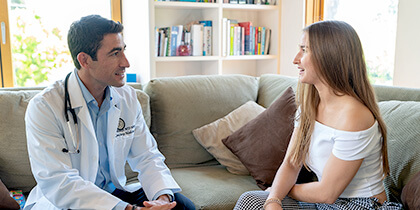Family
Addiction affects every member of the family and so every member of the family can benefit from taking part in the recovery process. If the client wishes to engage in family therapy, then MD Home Detox can make referrals.
Our therapists work closely with family members to identify ways their loved one’s addiction has affected them as well as how they might have impacted their loved one’s addiction. Family members can attend our workshops to learn about healthy boundaries, codependency, addiction, co-occurring disorders, and improving communication. Our therapists also assist family members in finding more resources for support in the community, such as groups, hobbies, or classes.
What is Family Therapy?
This type of therapy focuses on bringing family members together to improve their relationships with one another and the functionality of the family unit as a whole. Families gather with a licensed therapist to identify pressing issues, address them in a healthy manner, and work to improve communication and empathy towards one another. Family therapy can last as long as the family would like, however, this type of therapy is not one that is usually participated in long-term. Instead, families often partake for a short period of time in order to gain insight and develop healthy habits.
Who Should Go?
Addiction is a family disease, which is why it is recommended that most families participate in their loved one’s addiction therapy as well as attend their own sessions, workshops, and other helpful events. When participating in therapy, you can explain to your loved one how their addiction has affected your life and the relationship you have with them. This will help heal the bond between you while encouraging them to realize they are not the only one their addiction has impacted.
Family therapy is especially beneficial when a child or adolescent is the one with an addiction. Addicted kids have a hard time getting sober and staying sober — often struggling more than adults. Without adequate help, adolescent addicts are also far more likely to struggle with frequent relapses. For them to get clean for good, they need to know they have their family’s unconditional love and support.
What Role Does Family Have in Recovery?
When one family member is an addict or an alcoholic, it is common for other members of the family to fall into toxic roles that influence the entire unit. This can be very hard for family members to accept as they do not understand what they are doing wrong. Family therapists can help them to see their behaviors from the viewpoint of their addicted loved one, so that they can comprehend and improve their mentality and actions. Examples of these behaviors include:
• Enabling. Family members might think they are helping their loved one by lending them money or bailing them out of jail, but they are actually enabling the addict or alcoholic.
• Dismissing. Some might need to attend family therapy so that they can take their loved one’s addiction more seriously and understand when they are triggering them.
• Unhealthy coping. It is not uncommon for family members to begin abusing substances to cope with the chaos, stress, and guilt that comes with their loved one’s addiction.
If you are a family member who has fallen into any of these patterns, it is okay. Family therapy will help you become educated, develop empathy, and better your communication skills in reference to your loved one’s struggle with addiction.
Benefits of Family Therapy
Decades of research have found that family counseling is a very important part of helping addicts and their families heal from the emotional damage of addiction and mental health conditions. It can also aid the individual struggling with addiction in maintaining their sobriety long-term. This is because it provides them with a united sense of support and a healthy home environment to return to after treatment. The following highlight specific benefits of family therapy.
Improves Communication
Having a safe space to express feelings and concerns can feel liberating to both the person with addiction and their family members. Giving each person an outlet to use their voice sets the stage for open and honest communication. This is imperative in the healing of broken relationships and the strengthening of essential bonds.
Establishes Healthy Boundaries
It can be hurtful to see your loved one in the throes of addiction. You want to help, however, your assistance can do more harm than good. Family therapy allows you to establish healthy boundaries so that you can help your loved one in constructive ways while maintaining your own sense of happiness and purpose.
Promotes Age-Appropriate Roles
Children whose parents are battling a substance abuse problem often step up and take more responsibility than they should. It is important to address this, so both the addicted parent and child know what is expected of them while reducing the stress put on the child.
Builds Trust
Sometimes, addicts do or say uncharacteristic things. These actions can be hurtful, and make you lose your trust in them. An important component of family therapy is regaining that sense of trust as your loved one continues to heal and grow.
Family Therapy in Los Angeles
The disease of addiction is just that — a disease. It infiltrates even the most resilient of families and can have disastrous effects on everyone it touches. Family therapy in Los Angeles can help family members whose loved ones have a drug or alcohol problem and/or mental health conditions. If you and your family are ready to get the help that you need to have a healthy, functional family again, call us or use our contact form today.











